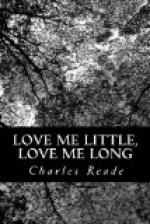“Hold your tongue!” said Eve, sharply, but in considerable agitation. “It is too late now, after something you have said to me. If I didn’t speak out now, I should be like that bad man you told us of, who let out the beacon light when the wind was blowing hard on shore. Listen, David, and take my words to heart. The road you are on now I have been upon, only I went much farther on it than you shall go.” She resumed after a short pause: “You remember Henry Dyke?”
“What, the young clergyman, who used to be always alongside you at our last anchorage?”
“Yes. He was just such a man as Miss Fountain is a woman. He was but a dish of skim-milk, yet he could poison my life.”
Then Eve told the story of her heart. She described her lover as he appeared to her in the early days of courtship, young, handsome, good, noble in sentiment, and warm and tender in manner. Halcyon days—not a speck to be seen on love’s horizon.
Then she delineated the fine gradations by which the illusion faded, too slowly and too late for her to withdraw the love she had conceived for his person at that time when person and mind seemed alike superior. She painted with the delicate touch of her sex the portrait of a man and a scholar born to please all the world, and incapable of condensing his affections; a pious flirt, no longer stimulated to genuine ardor by doubts of success, but too kind-hearted to pain her beyond measure when a little factitious warmth from time to time would give her hours of happiness, keep her, on the whole, content, and, above all, retain her his. Then she shifted the mirror to herself, the fiery and faithful one, and showed David what centuries of torture a good little creature like this Dyke, with its charming exterior, could make a quick, and ardent, and devoted nature suffer in a year or two. Came out in her narrative, link by link, the gentle delicious complacency of the first period, the chill airs that soon ruffled it, the glowing hopes, the misgivings that dashed them; then the diminution of confidence, more complexing and exasperating than its utter loss; the alternations of joy and doubt, the fever and the ague of the wounded spirit; then the gusts of hatred followed by deeper love; later still, the periodical irritation at hopes long deferred, and still gleams of bliss between the paroxysms, so that now, as the vulgar say in their tremendous Saxon, she “spent her time between heaven and hell”; last of all, the sickness and recklessness of the wornout and wearied heart over which melancholy or fury impended.
It was at this crisis when, as she could now see on a calm retrospect, her mind was distempered, a new and terrible passion stepped upon the scene—jealousy. A friend came and whispered her, “Mr. Dyke was courting another woman at the same time, and that other woman was rich.”
“David, at that word a flash of lightning seemed to go through me, and show me the man as he really was.”




